
I've been seeing more and more games putting an emphasis on mechanics oriented around environmentalism and sustainability. Games in genres that typically encourage unchecked exploitation of resources are now becoming more and more about the sustainable use of resources. It makes sense. Climate change is becoming more and more of a visible problem that affects our lives in tangible ways. Milliennial game developers are also searching for ways to cope with the fact that our generation and the next will be stuck paying the consequences of the short-sightedness of our parents' and grandparents' generations. Many members of those earlier generations are still, unfortunately in positions of political and corporate power, and make up a large voting block, and are continuing to make selfish, short-sighted decisions that will only make matters worse for the younger generations. It makes sense that younger game developers would be baking those anxieties into the games that they make.
Ecologically-focused colony-building
Imagine Earth is the type of city-builder / strategy sim that has typically been about conspicuous consumption, but it now wants the player to consume more responsibly. Not only does this game expect the player to industrialize the surface of entire planets at the behest of a corporation, it also asks the player to do that with an eye towards limiting greenhouse gas emissions, deforestation, and other pollution. Developing a sustainable economy doesn't only mean cutting back on emissions from power plants, industrial activity, and so forth. It also requires restoring or expanding natural habitats by planting forests, growing corals, and so forth.
Imagine Earth prioritizes limiting greenhouse emissions and pollution.
Either the player has to plan the growth of your colonies in a sustainable fashion and prevent emissions and pollution from ever getting out of hand to begin with, or you have to spend the back half of each mission doing damage control.
Unfortunately, just like in real-life, any individual person or corporation or government's environmental efforts aren't necessarily sufficient to curtail the effects of climate change. There are often other corporations or settlements on these planets which don't have the same noble ecological goals, and who will happily ruin things for everybody else. They are there to make a quick buck by exploiting as much of the resources as possible, with no plans for sustained long term habitation -- the other people living on the planet be damned. But the corporation we work for in Imagine Earth does plan on prepping these planets for long-term colonization, so we have to pick up those other corporations' messes. Sometimes through violence, coercion, or sabotage, but usually through a hostile takeover of majority stake.
Not all corporations are concerned with long-term colonization that requires a stable environment. [More]
3015a39c-bf3c-4cdb-aaa7-a2a32b1669c6|0|.0
Tags:Imagine Earth, Serious Brothers, Steam, PC, indie gaming, simulation, planet, strategy, science fiction, corporation, capitalism, environmentalism, climate change
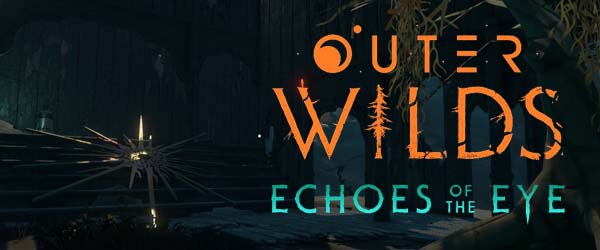
When I played it last year (after waiting over a year for its timed Epic Store exclusivity to end), Outer Wilds quickly became one of my favorite games ever due to its innovative sci-fi, exploratory gameplay in its dynamic sandbox solar system full of interesting places that are genuinely worth exploring. It was a compelling sci-fi game about the nature of science and the desire to find out place in the universe. It was also a compelling player-driven mystery game that doesn't hold the player's hand and which provides genuine "eureka!" moments.
I wasn't expecting an expansion because the game seemed so perfect and self-contained that I struggled to even think of what could be included in an expansion. Would they add more planets to the solar system? Would it be a stand-alone prequel with the player playing as one of the extinct Nomai?
But I sure as hell was not going to pass up an excuse to revisit Timber Hearth!
I wasn't going to pass up an excuse to revisit Timber Hearth!
River rafting around the world
One of my favorite things about Outer Wilds is its open-ended exploration of the hand-crafted solar system. Each world is a little puzzle box for the player to unlock, with the solutions to every puzzle involving some sci-fi physics concept that the player has to learn and apply.
The puzzles of Echoes of the Eye don't seem to have that same sci-fi quality to them. Most puzzles involve the use of light, and feel like they could be puzzles in any earthbound adventure or fantasy setting. I just point flashlights at things to trigger mechanisms, turn lights off or on to trigger secret passageways, or turn off my source of light to sneak past photo-sensitive sentries in the dark. I guess I should praise the puzzle design for never falling back on the tried-and-true (yet rote) method of reflecting light off mirrors or through prisms. The actual puzzles are a bit more clever than this, but I just don't find it to be a very engaging or interesting gimmick, especially compared to how novel and creative the core Outer Wilds puzzle box is.
The use of light as the instrument for most interactions with Echoes of the Eye seems to be the result of a concerted effort by the developers to use base game mechanics that are under-utilized in the base game, such as the flashlight and ability to nap at bonfires. The puzzles just lack that sense of awe and discovery that comes with progressing in the base game.
Echoes of the Eye starts off strong with solving a space-based mystery.
Some of the late puzzles do start to embrace Outer Wilds's sci-fi nature. They hide some very fun and interesting surprises that really mess with the player's perception of reality in a very video-game-meta sort of way. But they are so esoteric that the game almost has to literally tell the player what to do. It's like "summoning the tornado in Simon's Quest" levels of esoteric at times.
Honestly, I think the single best puzzle in the game is the one that the player has to solve just to get access to the DLC! It's also the most "Outer Wilds" feeling puzzle in the game. The developers managed to cleverly hide the DLC in plain sight, as if it had been there all along.
The opening for the DLC tasks the player with finding a remote satellite and solving a simple puzzle involving it. Then the expansion treats the player with the awe-inspiring discovery of a massive hidden world that makes up the expansion's primary setting. After that, however, everything feels like pretty typical adventure game stuff. Instead of planet-hopping in a tiny space capsule, I find myself white-water rafting and watching home movies on slide projectors. Later on, there's some horror-adjacent exploration of dark spaces with just a flashlight, and even a little bit of hide-and-seek. Again, it's nothing I haven't seen in a hundred other indie games.
[More]
15313440-eb6a-44bf-a4ea-2d4d369d1f4e|0|.0
Tags:Outer Wilds, Echoes of the Eye, Steam, PC, Epic Game Store, science fiction, mystery, exploration, open world, Eye of the Universe, solar system, space, ring world
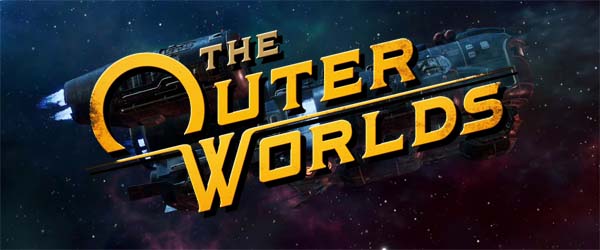
Obsidian Entertainment's follow-up to Fallout: New Vegas was a hotly-anticipated game for me, but it's timed exclusivity on the Epic Game Store meant that I had to wait an extra year to play it. I probably could have gotten it on console. I didn't because I was worried about performance limitations, but I don't recall reading or hearing too many complaints, so maybe it was fine on consoles. Ah well, much like Outer Wilds, I may have ended up waiting unnecessarily long to play The Outer Worlds. Unlike Outer Wilds, The Outer Worlds is not the instant-classic that I had hoped it would be.
Here I come to save the worlds!
The early hours of Outer Worlds seemed promising enough. The game is based largely around the same factional conflicts that drive the plot of Fallout: New Vegas, with the player dropping into an unfamiliar situation, and solving the locals' problems in one of several ways. Most quests will require the player to chose sides in a conflict and fight the opposing side, unless you have high enough speech skills to negotiate some kind of peaceful solution.
This sort of stuff is, of course, the highlight of the game. The relationships between quest-giving characters and their respective factions are like little puzzles for the player to figure out -- puzzles that can be solved equally effectively with kind words, as they can be with a gun, or sometimes both a kind word and a gun. Outer Worlds rewards the player for doing that little extra bit of due diligence to complete an optional objective, or to hack that terminal to find some juicy bit of intel that I can use to sway an NPC to give you what you want.
Players also assemble a crew of companion characters, each with a strongly-defined role. Each companion provides buffs to certain player skills. Parvati provides a buff to engineering skills, Ellie provides a buff to medical skills, Max provides buffs to hacking, and other characters provide various combat skill and intimidation buffs. These buffs can stack together and get quite large too, especially after you take one or two perks to improve them. I hardly ever needed to use food or drugs to buff a skill because my companion characters almost always provided me with enough of a boost to get me through most quests.
Players create a crew of companion characters to go questing with you.
I was actually surprised at how early in the game I had recruited all possible crew member. All but one come off of the first world, and the final one can be acquired on an early game quest on another world.
Which companions I take on a particular quest is, therefore, important. I found it was a good idea to pay attention to the dialogue from quest-givers to get a better idea of what lies ahead for me in a given quest. It's also worthwhile to check out the quest log to get any insight on what I'm expected to do. Going on a "bug hunt"? I'll take my heavy-hitters like Nyoka or Felix. Need to hack my way into a derelict outpost and get it operational again? Take Parvati and Max. Need to rescue some colonists who are trapped in a cave? Take Ellie and Nyoka in case anyone needs medical attention.
Or at least, that's how it works in principle. Remember when I said that the game seems promising in the beginning? Well that's because the opening chapter of the game is a very well-constructed vertical slice of everything that Outer Worlds has to offer. The downside is that, unlike Fallout: New Vegas (which has a similarly excellent opening chapter that serves as a vertical slice preview of the whole game), the whole rest of The Outer Worlds is just the opening quests repeated several more times on different planets, and it never gets much harder or more surprising.
In practice, there weren't very many quests that required diverse skills. I only specifically remember having to treat an NPC's wounds twice, and one of those was at the very start of the game before I had Ellie in my party anyway. Even though I kept taking Parvati whenever I thought I was going to need to repair things, there were still only a handful of engineering checks, and I recall them all being relatively easy. Honestly, I found that quests seemed to be much more dominated by speech checks, and my companions were mostly just bullet sponges and pack mules. [More]
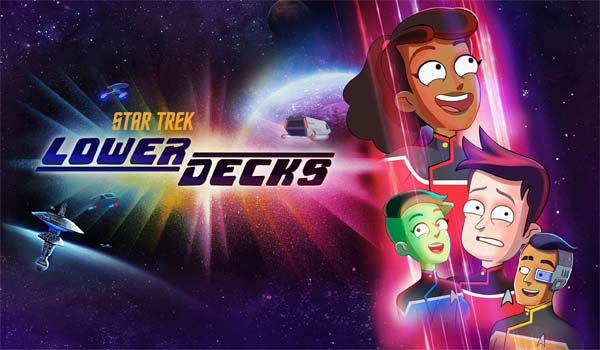
It took me a while to get around to watching this one. After having been immensely disappointed and frustrated with both Star Trek: Discovery and Picard, I was not going to give CBS a single penny of my money. I still haven't watched the second season of Discovery (let alone the third), despite having heard that the second season is an improvement. In fact, I've been so bitter at CBS that I didn't even bother activating my account to stream the second season of Twilight Zone, even though the first season was good enough that I was curious to see the second season. I also didn't bother reactivating my CBS account to stream Star Trek: Lower Decks, even though my partner really wanted to watch it.
I was willing to cut a little more slack for Lower Decks, on the grounds that "surely an animated comedy will not be considered 'canon', so I don't have to take Lower Decks as seriously." But then I started seeing events, characters, and ships from Lower Decks showing up in articles on the Memory Alpha Star Trek wiki, and the thought of having to take Lower Decks seriously as canon tanked my interest in watching the show. I wouldn't be able to sit back and enjoy Lower Decks in the manner that I enjoy something like The Orville; I would have to watch it with my critic glasses on, and the baggage of expectations that comes with carrying the Star Trek torch.
I told my partner I didn't want to pay for CBS, so we would wait until all the episodes had aired, do the free trial with a new email address, and binge them all in like a weekend or something. And maybe I'd check out season 2 of Twilight Zone while I was at it. But we didn't keep track of the progress of the show, it fell onto the back-burner, and we just didn't get around to it.
Then, a few weeks ago, a friend offered to let me borrow his downloads of the show, as well as offering pretty high praise. My partner and I still wanted to give Lower Decks a chance, so I accepted, and we watched it.
... And it's ... fine. It's fine. It's OK.
The Best "Trek" that CBS has to offer?
Lower Decks is entertaining enough. It provides a decent laugh here and there. And it's actually telling some high-concept sci-fi stories -- albeit wrapped in a layer of absurdist comedy. As a stand-alone show, without the baggage of the "Star Trek" title, it's perfectly serviceable. It's not quite up to the level of The Orville -- at least not once The Orville had set aside the Family Guy antics and started focusing more on its characters and stories.
 - ST: Animated Series "More Tribbles, More Troubles", episode 5
- ST: Animated Series "More Tribbles, More Troubles", episode 5
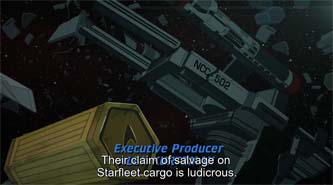 - ST: Lower Decks "Terminal Provocations", season 1, episode 6
- ST: Lower Decks "Terminal Provocations", season 1, episode 6
Lower Decks remains faithful to the aesthetic of Star Trek, while still establishing its own visual identity.
And you know what, as an official installment of Star Trek, Lower Decks ain't bad either. Lower Decks is certainly the best Star Trek show that CBS has created for its streaming service so far, and definitely [ironically] the most worthy of "canon" status. [More]
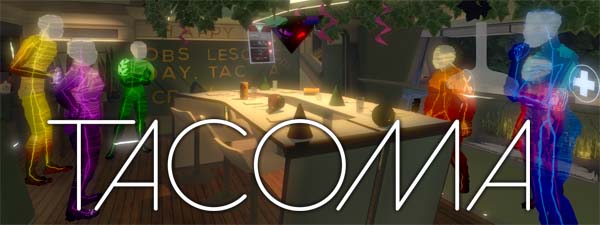
Here's another short sci-fi game from my Steam backlog. Tacoma is Fullbright's sci-fi follow up to its masterful walking sim Gone Home. This time around, instead of playing as a young girl discovering the secrets of your family, you play as an agent of a corporate conglomerate sent to retrieve the company's A.I. hard drive from a defunct space station in which an emergency threatened to kill the entire crew. Instead of reading notes and journal entries, you instead replay holographic representations of logs that the station's onboard A.I. recorded of conversations between the station's crew members.
You have to eavesdrop on recorded conversations as holograms move around the station.
The whole process is much more active and player-driven than the exposition of Gone Home (and other walking sims) because the holographic recordings of the characters move around the stations and converse in real time. You don't just walk into a room and read a conspicuously-placed note or listen to passive narration. You'll have to follow the characters between rooms, and keep track of multiple conversations at once as the characters come and go, and as they split up from large group meetings and start to have smaller, more private conversations. Each recording will usually have 2 or 3 independent conversation threads for you to follow. As you follow each character around, you'll also be spying on their personal text messages and emails.
This gives a greater sense of participation from the player (compared to many other walking sims) and provides a greater illusion that you are solving a mystery. That being said, there's nothing too challenging about finding and listening to all the possible conversations. They aren't elaborate puzzles that will take time to figure out. You just follow each character around the space and listen to them. It keeps the player interacting with the game space without ever applying a high bar for progress.
Don't expect to be stumped by the puzzles.
Without spoiling too much, there is only one ending, and you aren't going to be punished for not uncovering all the available evidence. The worst aspect of the game's "walkign sim" nature is that you're also never asked to apply any of the knowledge that you acquire from your investigations other than a handful of numeric combination codes for unlocking doors and the like. These codes are basically just progress gates to provide the illusion that the game has "puzzles", but the early exposure to these key codes will further encourage the player to snoop around more thoroughly for potential clues to future puzzles or progress gates. It isn't very intellectually challenging, but it does encourage the player to pay more attention.
[More]
ad0da423-9efe-41a3-b0fc-37ab8db4fe16|0|.0
Tags:Tacoma, Fullbright, science fiction, walking simulator, artificial intelligence, corporate culture, stock market, Amazon, Tyson Foods, COVID-19, pandemic
|

| 12 | | | | | | | 60 | | 11 | | | | | | | 55 | | 10 | | | | | | | 50 | | 09 | | | | | | | 45 | | 08 | | | | | | | 40 | | 07 | | | | | | | 35 | | 06 | | | | | | | 30 | | 05 | | | | | | | 25 | | 04 | | | | | | | 20 | | 03 | | | | | | | 15 | | 02 | | | | | | | 10 | | 01 | | | | | | | 05 |
|